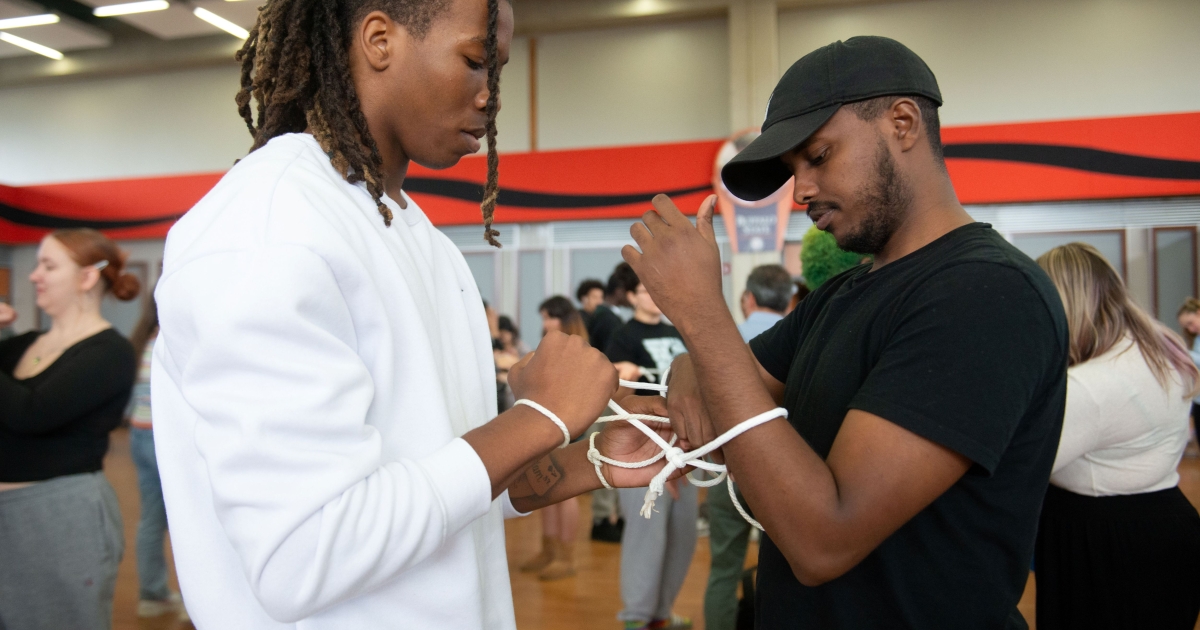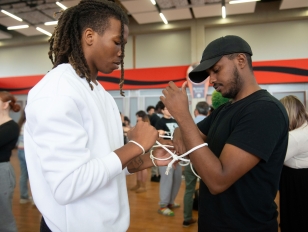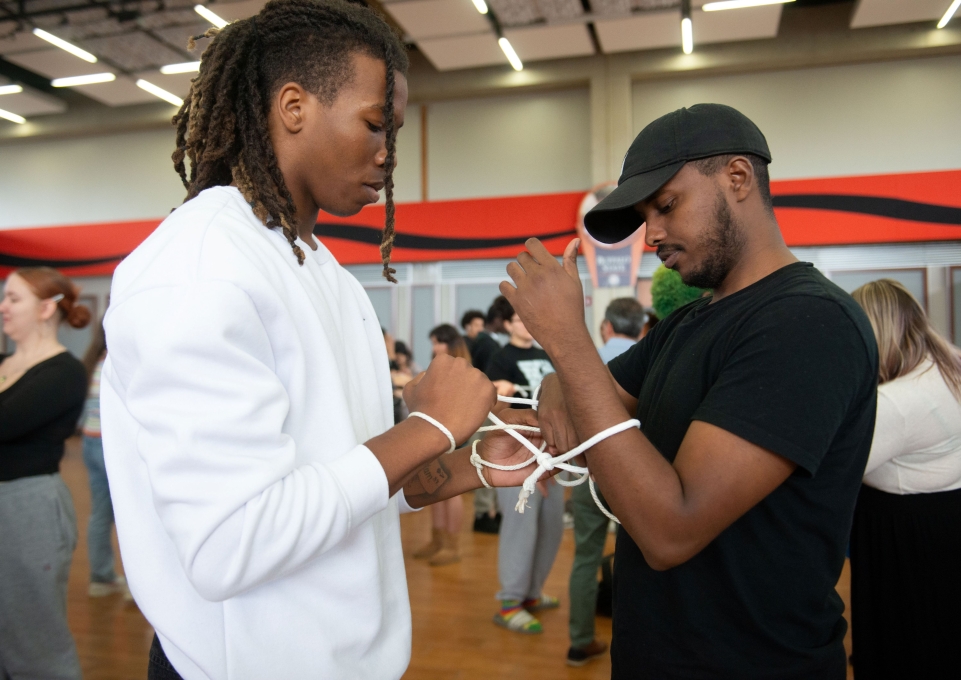
Each year, Buffalo State’s Anne Frank Project (AFP) hosts the Social Justice Festival, a two-day celebration of stories that invites participants to build community, manage conflict, explore identity, and wrestle with the world’s most pressing issues. The 17th annual Social Justice Festival, “Belonging Begins Here,” will take place October 8 and 9.
Since its inception in 2009, the Social Justice Festival has explored issues like social responsibility, inclusion, mental health, systematic racism, innovations in education, and healing. This highly experiential festival includes workshops, performances, and art exhibits that challenge, teach, and explore diverse social and personal justice topics.
This year’s theme was chosen through AFP’s standard process: members of the AFP advisory committee create a list of five potential themes reflective of Buffalo State community, the nation, and the world that are shared with the university president and provost for selection. This year, said AFP founding director Drew Kahn, the decision was instantaneous.
“Current research: shows that ‘a sense of belonging’ is listed as one of the top three reasons students choose one school over another,” Kahn said. “Belonging is not just a value—it’s a foundation. It’s rooted in Buffalo State’s mission and commitment to access, identity, and social justice. As we face evolving social issues, our power lies in partnership—sharing our ideas and knowledge and creating spaces where everyone can thrive.”
Here are five things to look for at this year’s festival.
Opening session dedicated to this year’s theme with provost Amitra Wall
The festival’s opening session will focus on defining belonging through story-based learning, a pillar of AFP’s work. Provost Amitra Wall will join attending students in an exercise during which participants will redefine what belonging means to them through the creation of small group stories.
“That’s right, our students will be creating and defining ‘belonging’ with their provost!” Kahn said. “The results of this session will be posted for all attendees to see throughout the two days. I believe we will be the only university in America where the provost and vice president of academic affairs will work, kinesthetically, with their students.”
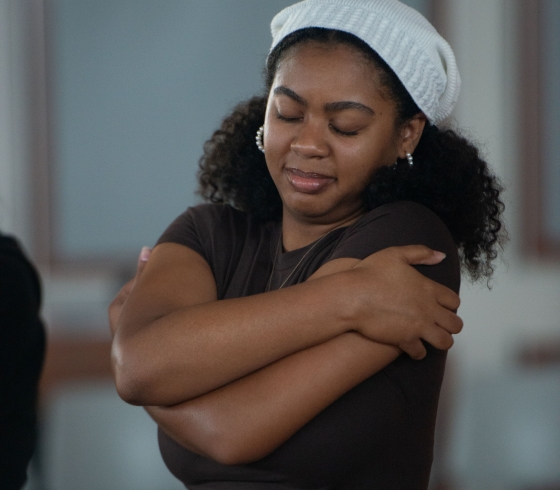
A celebration of experiential learning
The Social Justice Festival was designed to be somewhere students experienced justice, said Kahn, rather than just talking about it.
“Universities around the country have talked about personal and social justice a lot, but what do the students do with those conversations?” he said. “Justice happens as a result of action. We want the SJF to be a ‘playground’ for faculty, staff, and the community to try new applied learning ideas to measure impact, structure, and pedagogy.”
Some of this year’s interactive sessions include:
- Sophia’s Legacy: Holocaust, Genocide and Conflict Education in the Classroom with Dr. Andrew Hashey, Leigh-Anne Hendrick, and Jeanette Koncikowski; Wednesday, October 8 from12:00–1:30 p.m.
- Find Your Voice! Advocating for Your Rights with Dr. Kimberley Zittel-Barr; Wednesday, October 8 from 3:05-4:20 p.m.
- Connecting Cultures: The Dreamcatcher Project with Lorinda John, ’25; Thursday, October 9 from 3:05–4:20 p.m.
For a full schedule of interactive sessions, visit the AFP website.
More faculty and staff presenters than ever
While sessions led by Buffalo State faculty and staff members have always been a key component, participation is now at an all-time high. The incorporation of this variety of perspectives is essential to the festival experience, Kahn said.
“Stories are for everyone and every discipline,” he said. “Witnessing stories from a diversity of approaches, thinking, and objectives is the essence of a liberal arts education. The strongest form of teaching is modeling—our students must see their professors and mentors lead and share their research and creative activity. Diversity of thought exchanged in a civil environment may be the most important lesson we can teach our students and each other.”
“Stories are for everyone and every discipline. Diversity of thought exchanged in a civil environment may be the most important lesson we can teach our students and each other.”
Some of this year’s faculty and staff-led sessions include:
- Voicing the Unheard: Belonging and Liberation with Dr. Ho Eui Holly Bewlay; Wednesday, October 8 from 4:00–5:30 p.m.
- Building and Sustaining a Sense of Community at Buffalo State with Drs. Kelly Frothingham, Wendy Patterson, and Amitra Wall; Thursday, October 9 from 1:40–2:55 p.m.
- They Not Like Us: The Social Neuroscience of Belonging with Dr. Gehan Senthinathan; Thursday, October 9 from 4:30–5:45 p.m.
“The ‘use’ of AFP by departments, programs, and offices continues to grow as they realize we are built to target some of the most pressing issues in education,” Kahn said, “and that we provide an important space for these opportunities.”
Stories from Rwanda study abroad students—from 8 different majors
Since 2011, AFP has brought more than 170 students to Rwanda for a study abroad program that utilizes stories as the curricular platform in the classroom and allows the delegation to immerse itself in authentic experiences in schools, Genocide memorials, safaris, urban and rural villages, and local markets. At the festival, students from the 2025 delegation will share their experiences.
“There are many myths about the continent of Africa; these stories immediately replace myths with personal stories to form the reality,” Kahn said. “Our students reflect on the many lessons learned in Rwanda and are encouraged to answer the question, ‘How will you bring your Rwanda lessons back to Buffalo?’
The Rwanda program has seen great participant variety. This summer’s delegation comprised students studying creative writing, criminal justice, English, international relations, political science, social work, speech-language pathology, and theater.
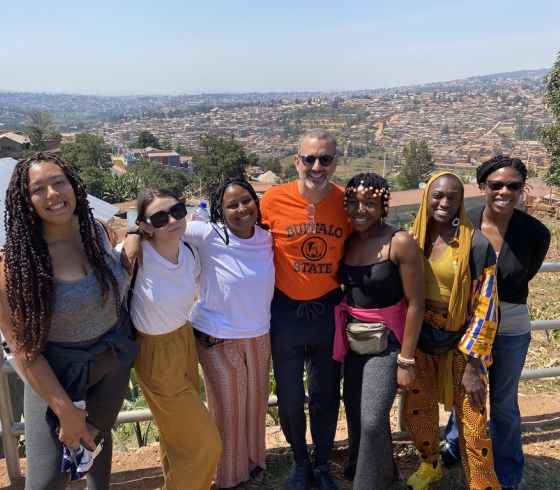
AFP assistant director Jonise Hall, AFP founding director Drew Kahn (center left and right respectively) and provost Amitra Wall (far right) in Rwanda with Buffalo State students.
“Discussing reconciliation post-genocide with students from a diversity of majors is thrilling,” said Kahn. “We learn better from others outside our discipline, and this is exactly what our students will experience in their future workplaces. Interdisciplinary collaboration is a skill employers are demanding—our job is to prepare our students for the world they are entering.”
“These stories will be especially impactful for students considering the Rwanda trip, as they’ll hear firsthand how the experience has shaped our students,” added Jonise Hall, assistant director of AFP. “Many come back with a transformed perspective on forgiveness, reconciliation, the role of education in healing communities, and the profound possibilities of what humanity is capable of at its best. Some have changed the trajectory of their careers after returning. Hearing these reflections not only helps future travelers understand the depth of the journey but also shows how the trip can influence one’s story.”
Opportunity to volunteer and receive a festival shirt
The Social Justice Festival does not happen without a lot of hard work, including the work of volunteers that not only assist with greeting and set-up, but also play an important role in helping lead sessions and putting participants at ease.
“Because the festival is rooted in hands-on, experiential learning, volunteers help encourage and engage attendees to fully participate,” Hall said. “This kind of involvement can feel new or different for many people, and our volunteers help create a welcoming environment where everyone feels comfortable joining in.”
All volunteers receive an orange festival shirt, which features the official poster artwork. Interested parties can sign up on the AFP website.
To get a full schedule of festival events, register, or sign up to volunteer, visit the AFP website.
Photos courtesy AFP.
